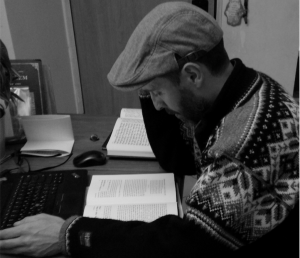Rosh HaShanah of Love
I’m not ready for another batch of High Holidays in the light of Divine judgment, ten days of introspection followed by twenty-five hours of fast and prayer, fear and sorrow for sins committed, and then a whole week of transience inside the Sukkah. I’m not ready for the annual reiteration of the rhetoric of fear and judgment – I’d be glad to welcome discourses of love, of embracing understanding, afar from the stern and wrathful elaborations on a Divine entity which seems to reflect more and more, as I get older, those who pray to it, fashioned by liturgy and yearnings. And while this may sound to a skeptical and scrutinizing reader as a slip into a quasi-Pauline take on the Jewish religious conceptions, where Paul of Tarsus calls for believers to perceive the spirit of the Law and discard its fleshly rigidity, what I am trying to call for is a rekindling of the rhetorics of love and acceptance, and set aside the endless mumbling about the Divine judging humanity as a flock of sheep.
Psychologically this call for love and for an approach of embracing acceptance, can have immediate positive effects on the rekindling of my religious passion – my teshuva, my return to myself and to the core of my truths which, for the sake of clarity we might call the Divine spark in me, cannot be the result of a quasi-manichean understanding of “sins,” good actions versus bad actions, but the acceptance of everything in me, the acceptance of all actions, with the constant consciousness that who and what I am today is also the result of my mistakes. This approach, which of course must entail a process of introspection and critical self-examination, takes love as the necessary means for the formation of a unity, rather than the splitting of a man’s life into diverse and irreconcilable phases. I am a diverse being, a complicated, at time utterly contradictory and chaotic mind, and yet all my sides, “All my bones shall say, ‘LORD, who is like You?’” (Ps. 35.10). Rather than create unbearable and excruciatingly painful cleavages between the different sides of a person’s being, intellectual and spiritual, with the surgical tool of judgment and pitiless scrutiny, I’m now at that stage in life where a loving, embracing and enveloping acceptance of my good and bad sides, my acceptable and unacceptable behaviors, is the sole way to provide this messy mound of life fragments with a smattering of symmetry and harmony.
So as Rosh HaShana yet again approaches, and we prepare to wish one another a sweet and good year, full of providential success and internal light, I want to wish myself and those readers who have been kind enough to read my column up to now, a teshuva made of loving understanding, leading to what Rav Moshe Weinberger, the leading figure of the neo-chassidic movement in New York and who has reinstated the importance of “love” in the religious rhetoric of Jewish entourages, has come to call the “passionate love-affair with God.” A passion-less and awe-struck religiosity leads, as in a sterile bond between a man and a woman, to the death of desire, to a mortal rigor and uncompromising detachment – this is time for love, a love for ourselves, a love for God, in the fervent belief that the Divine accepts and endorses the imperfection of one’s sinful actions just as he endorses the faithful adoration and compliance with his laws. Seen through stern eyes, this is a paradox – seen through loving eyes, this appears as a beauteous symmetry.
Shanah tovah u-metukah.
*Yaakov Mascetti holds a Ph.D. and teaches at the Department of Comparative Literature, Bar Ilan University.

